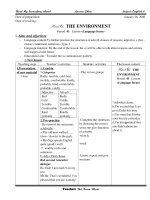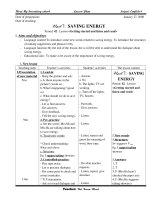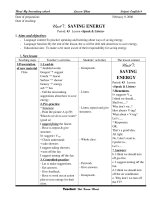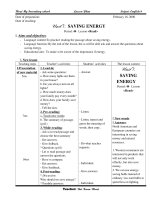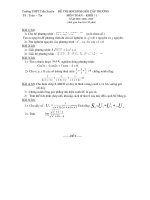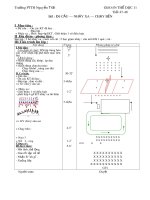giaoan
Bạn đang xem bản rút gọn của tài liệu. Xem và tải ngay bản đầy đủ của tài liệu tại đây (856.32 KB, 15 trang )
<span class='text_page_counter'>(1)</span><div class='page_container' data-page=1>
<i>* Aim :</i>
<i>Helping students :</i>
- <i>To give and respond to suggestions </i>
- <i>To discuss the solution to saving energy </i>
- <i>To write a speech </i>
<i>* Objective :</i>
<i> By the end of the lesson, Ss’ll be able to give and respond to suggestions, to discuss</i>
<i>the solution to saving energy , write a speech with connectives : and, but, because, or , so ,</i>
<i>therefore, however , phrasal verbs : turn on, look for, look after </i>
<i>* Skills :</i>
<i>Listening , speaking, reading , writing</i>
<i>* Visual aids :</i>
<i>Text books, pictures, realia objects, cassette / teacher’s book</i>
<i>* Period :</i>
<i>42.Getting started- Listen and read +Lf 2</i>
<i>43.Speak + Lf 3</i>
<i>44.Listen</i>
<i>45.Read</i>
<i>46.Write +Lf 1</i>
<i>47.Test 3</i>
<i>48. Correction of Test 3</i>
</div>
<span class='text_page_counter'>(2)</span><div class='page_container' data-page=2>
Week 21 : (18 - 23/01/10)
Preparing date : 09/01/10
Periods : 42,43
<b>Period 42th<sub> </sub></b>
Unit 7 : Saving Energy
Lesson 1. Getting started – Listen & Read + LF 2
<i><b>1. Aim : </b></i>Helping Ss make suggestions with the structure to save energy.
<i><b>2. Objective : </b></i>By the end of the lesson, Ss’ll be able to save energy with : S + suggest + V-ing or S + suggest
+ (that) + S + should + Vinf.
<i><b>3. Skills : </b></i> Speaking, reading
<i><b>4. Visual aids : </b></i>Text book, pictures, posters.
<i><b>5. Procedure :</b></i>
<b>Content</b> <b>Teacher’s activities</b> <b>Sts’ activities</b>
<b>I. WARM UP (5’) Matching </b>
1 . plumber vòi sen (tắm)
2. faucet nước
3. drip thợ sửa ống nước
4. reduce đèn
5. light năng lượng
6. water vòi nước
7. shower nhỏ giọt
8. energy giảm
<b>II. PRESENTATION : (20’)</b>
<i><b>* Pre-teach</b></i> :
- a water bill : hóa đơn tiền nuớc
- enormous (a) : rất nhiều, rất lớn
- a crack : vết nứt
- a pipe : ống nước
* <i><b>Checking voca ( ROR )</b></i>
<i><b>* Set the scene</b></i> : (picture – getting started)
Is TV on? Is there anybody here? What should
we do to save energy? Should we turn off TV?
And now, Mrs Mi & Mrs Ha are talking about the
way how to save energy.
<i><b>* Pre questions :</b></i>
1. Is Mrs Ha worried about her water bill ?
-Giving instructions
+You match the words
with the meaning.
+Look at! What’s it?
+Synonym “very big”
+What’s this ?
+What’s this ?
-Checking memory
-Setting up the scene
-Giving instructions
+You guess in your
group & write the
answer on Bb
+You listen the dialogue
-Listening
-Working in groups.
+ water bill
+ enormous
+ crack
+ pipe
-Copying
-Writing on Bb
-Listening
-Guessing individual
- groups
</div>
<span class='text_page_counter'>(3)</span><div class='page_container' data-page=3>
2. What does Mrs Mi suggest ?
<i><b>* Listen and check the pre- questions :</b></i>
1. Yes, she is .
2. She suggests taking showers
<i><b>* Listen and repeat</b></i>
<i><b>* Practise with a partner </b></i>
<i><b>* Target item</b></i>
She suggests taking showers
<i><b>* Focus :</b></i>
Use : to make suggestions
<b>III. PRACTICE : (12’)</b>
<i><b>Word cues </b></i>
1. collect unused clothes .
I suggest collecting unused clothes.
2. organize a show to raise money
3. give lessons to poor children
4. help elderly people and war invalids with their
chores.
a. Write sentences with new words
I suggest that you should write sentences with new
words.
b. speak English in class
c. buy a good dictionary
d. do some reading everyday
<b>IV. PRODUCTION : (6’)</b>
<i><b>* True / False statements : ( P 58 )</b></i>
<i><b> Key :</b></i> 1.T 2.T 5.T
3. F : Mrs Ha has check will have a plumber check
the pipes.
4.F : Mrs Ha suggests getting some tool to check
doesn’t suggest.
(Mrs Mi suggests getting a plumber to make sure
there are no cracks)
<b>V. HOMEWORK : (2’)</b>
<i>* Write three sentences about the ways to save energy at</i>
<i>home and to make suggestions :</i>
Ex : I suggest turning off the light when we go out.
<i>*Lf 2 (P63) </i>
and answer the
questions.
-Correcting
+Repeat after me
-Correcting & writing on
Bb
-Presenting the target
item by checking the
concept
+What are these
sentences in Vnese?
+How does it form?
+When do we use it?
-Running through
sentences.
-Modelling
-Monitoring
-Giving instructions
+You read the text
again & choose the T/F .
Correcting
-Giving assignment
-Modeling
answering
-Listening &
repeating
-Practising in pairs
-Copying
-Listening
-Practicing
individual – pair –
groups
-Reading silently
-Doing the exercise
individually – pairs
– groups
-Listening
Taking notes
S + suggest + V-ing
</div>
<span class='text_page_counter'>(4)</span><div class='page_container' data-page=4>
<b>Period 43th<sub> </sub></b>
Unit 7 : Saving Energy
Lesson 2. Speak + Lf 3
<i><b>1. Aim : </b></i>Helping Ss give and respond to suggestions about how to save energy.
<i><b>2. Objective : </b></i>By the end of the lesson, Ss’ll be able to make suggestions about how to save energy with the
structures : S + suggest + V-ing
S + suggest ( that ) + S + should + Vinf
<i><b>3. Skills : </b></i> Speaking, writing
<i><b>4. Visual aids : </b></i>Text book, pictures, posters
<i><b>5. Procedure :</b></i>
<b>Content</b> <b>Teacher’s activities</b> <b>Sts’ activities</b>
<b>I. WARM UP (5’) Kim’s game </b>
<b>II. PRE-SPEAKING : (12’)</b>
<i><b>* Pre teach :</b></i>
- a gas fire : beáp ga
- (to) turn down : giảm nhỏ xuống
- (to) fix : sửa chữa
<i><b>* Check voca : ( RoR )</b></i>
<i><b>* Set the scene</b></i> : (situation)
Nam : The water is running . What should we do?
Ba : I think we should turn off the faucet.
Nam : Oh, but it doesn’t work.
Ba : I suggest fixing it
Nam : Ok . Let’s do that.
* Focus :
Suggestions Response
I suggest + V-ing
I think we should …
Shall we … ?
Why don’t we … ?
How about + V-ing?
What about + V-ing?
Let’s + inf
Ok .
That’s a good idea .
All right
Let’s
No. I don’t want to
I prefer to…
<b>III. WHILE – SPEAKING : (20’)</b>
-Giving instructions
+You look at the poster
carefully in 20 seconds and try
to remember as many words as
possible, (only remember
don’t write anything).
+And now I divide class into 2
groups. One st in one group
goes to the board and writes
one word you have seen from
memory.
+What is it ?
+Saying “giảm xuống” in E?
+Synonym “to repair”
-Checking memory
-Setting up the scene
+You have to work in pairs to
practise the dia
-Asking students to find out
other ways of making
suggestions
-Running through the pictures
-Listening
-Working in groups
+ gas fire
+ turn down
+ fix
-Copying
-Writing on Bb
-Listening
-Taking part in the
conversation
-Practicing in pairs
-Listening &
copying down nb
-Repeating in
Fan faucet bus
air conditioner water
motorbike gas television
</div>
<span class='text_page_counter'>(5)</span><div class='page_container' data-page=5>
<i><b>* Practise the dialogue a</b></i>
A. I suggest fixing the faucet
B. OK.
A . I think we should turn down the gas fire
B. All right
A. What about turning off the fan.
B. No, I don’t want to
<i><b>* Practise the dia b</b></i>
A. Oh, it’s still bright. I suggest turning off the
light.
B. Ok.
C. I think we should turn down the fan when we
go out to save energy.
D. Great . That’s a good idea.
<i><b>* Check closed pairs / groups</b></i>
<b>IV. POST – SPEAKING : (6’) </b><i><b>Role play</b></i>
<i><b>* Talking about yourself/ yourselves</b></i>
<i><b> Model :</b></i>
- I think we should play badminton
- Why don’t we play chess?
- How about watching TV
- I suggest doing our homework.
<i><b>-…</b></i>
<i><b>* Write it up :</b></i>
<b>V. HOMEWORK : (2’)</b>
<i>- Rewrite the suggestions of 8 pictures on p.59 into</i>
<i>notebooks and do Lf 3 P64.</i>
<i>- Prepare Listen</i>
+You practice the dia with
your partners
-Modelling
-Monitoring
-Giving instructions
+You work in group of 4 Work
out an action plan to save
energy for your class .
-Monitoring – giving assistant
-Checking
-Giving instructions
+You make a similar dia to
make and respond to
suggestions in free time.
-Correcting
- Giving assignment
chorus
-Working in pairs
-Working in pairs -
groups
-Feeding back
-Working in pairs -
groups
</div>
<span class='text_page_counter'>(6)</span><div class='page_container' data-page=6>
Week 22 : (25 - 30/01/10)
Preparing date : 09/01/10
Periods : 44,45
<b>Period 44th<sub> </sub></b>
Unit 7 : Saving Energy
Lesson 3. Listen
<i><b>1. Aim : </b></i>Helping Ss listen to the news on solar energy.
<i><b>2. Objective : </b></i>By the end of the lesson, Ss’ll be able to listen and understand the news on solar energy.
<i><b>3. Skills : </b></i> Listening, writing
<i><b>4. Visual aids : </b></i>Teacher’s book, cassette, pictures.
<i><b>5. Procedure :</b></i>
<b>Content</b> <b>Teacher’s activities</b> <b>Sts’ activities</b>
<b>I. WARM UP (5’) Net work </b>
<b>II. PRE-LISTENING : (12’)</b>
<i><b>* Pre teach :</b></i>
- solar (a) : thuộc về mặt trời
- solar panel : tấm kim loại nhận năng lượng
mặt trời
- nuclear power : năng lượng hạt nhân
- (to) install : lắp đặt
- effective (a) : hiệu quả
<i><b>* Check voca : </b></i>(slap the board)
<i><b>* Set the scene</b></i> : (chatting)
Do you know the solar energy ? Is it clean ?
How is the solar energy?
<i><b>* T/F prediction page 60 </b></i>
<b>III. WHILE – LISTENING : (20’)</b>
<i><b>* Listening ( twice )</b></i>
<i><b>* Checking the prediction</b></i>
<i><b> Key : 1.T 4. T</b></i>
<i><b>2. F</b></i> : Most of our electricity now comes from
the use of coal, gas, oil or nuclear power .
-Giving instructions
+You think about the energy and
then go to the board write down
the words you know.
+everything which is connected
with the sun.
+look at the picture
+năng lượng hạt nhân in English?
+Synonym “to put / to place”
+ hiệu quả in English?
-Checking memory
-Setting up the scene
-Giving instructions
+You guess in your groups and
decide these statements True or
False.
-Reading / Playing the cassette
-Correcting
-Listening
-Working in groups
+ solar
+ solar panel
+ nuclear power
+ install
+ effective
-Copying
-Slapping on Bb
-Guessing individual -
groups
- Listening
- Comparing –
correcting
Energy coal
oil
</div>
<span class='text_page_counter'>(7)</span><div class='page_container' data-page=7>
<i><b>3.F</b></i> : is enough to provide power for the total
population .
<i><b>5. F</b></i> : 2015
<i><b>* Listening (once)</b></i>
<i><b>* Fill in the blank :</b></i>
<i><b> Key : </b></i>
1. effective 2. pollution 3. countries
4. store 5. roof 6. instead
<i><b>* Tape transcript (</b></i>teacher’s book page<i><b>)</b></i>
<i>Are you looking for a cheap, clean, effective</i>
<i>source of power that doesn’t cause pollution </i>
<i>or waste natural resources? Look no further </i>
<i>than solar energy from our sun.</i>
<i> At present, most of our electricity come s </i>
<i>from the use of coal, gas, oil or nuclear power</i>
<i>This power could be provided by the sun. One </i>
<i>percent of the solar energy that reaches the </i>
<i>Earth is enough to provide power for total </i>
<i>population.</i>
<i> Many countries are already using solar </i>
<i>energy. Solar panels are placed on the roof of </i>
<i>a house and the Sun’s energy is used to heat </i>
<i>water. The energy can be stored for a number </i>
<i>of days, so on cloudy days you can use solar </i>
<i>energy too. </i>
<i> Sweden has an advanced solar energy </i>
<i>program. There, all buildings will be heated </i>
<i>by solar energy and cars will use solar power </i>
<i>instead of gas by the years 2015. </i>
<b>IV. POST – LISTENING : (6’)</b>
<i><b>* Write the summary using cue words :</b></i>
1. Most / electricity / come / coal / gas / oil /
nuclear power
2. Solar energy / provide / power / total
population .
3. We use / solar energy / cloudy days
4. All buildings / be / heat / solar energy /
2015 / Sweden
<b>V. HOMEWORK : (2’)</b>
<i>- Write the story above into nb </i>
<i>- Prepare Read</i>
-Reading / Playing the cassette
+You guess and fill in the blanks
with the missing words
-Correcting
-Giving instructions
+You complete the summary on
solar energy you hear.
-Giving assignment
-Listening
-Work in groups
-Correcting
-Listening
-Writing in groups
</div>
<span class='text_page_counter'>(8)</span><div class='page_container' data-page=8>
<b>Period 45th<sub> </sub></b>
Unit 7 : Saving Energy
Lesson 4. Read
<i><b>1. Aim : </b></i>Helping Ss read the text for details about saving energy.
<i><b>2. Objective : </b></i>By the end of the lesson, Ss’ll be able to understand the details of a passage and know how to
save electricity and money.
<i><b>3. Skills : </b></i> Reading, speaking
<i><b>4. Visual aids : </b></i>Pictures, posters
<i><b>5. Procedure :</b></i>
<b>Steps/Content</b> <b>Teacher’s activities</b> <b>Sts’ activities</b>
<b>I. WARM UP (5’) Ordering pictures </b>
<b>II. PRE-READING : (12’)</b>
<i><b>* Pre teach : </b></i>
- a bulb : đèn tròn
- a consumer : khách hàng
- scheme : kế hoạch
- a innovation : sự đổi mới
- efficient (a) : hiệu quả , năng lực
<i><b>* Check voca : </b></i>(slap the board)
<i><b>* Set the scene</b></i> :
As for you :
1. How much electricity does a TV use?
a bulb
2. What can we do to spend less on energy?
And how about households in Western or European?
3. What can they do to save money?
<i><b>* T/F prediction :</b></i>
1. In Western countries, electricity , gas, and water are
luxuries.
2. Western consumers want products that will not only
work effectively but also save money.
3. For most North American households are interested
in saving money and natural resources.
4. In Europe, the labels don’t tell the consumers how
much energy efficiency each model has.
<b>III. WHILE – READING : (20’)</b>
- Giving instructions
+ You order these
things from the height to
the low about using
electricity .
+What is this?
+a person who buy
goods that he will use
himself.
+Synonym “plan”
+sự đổi mới in English?
+Synonym “effective”
-Checking memory
-Setting up the scene
-Asking Ss some
questions.
-Giving instructions
+You guess in your
group and decide these
statements True (T) or
False (F).
- Listening
- Ordering in groups .
+ bulb
+ consumer
+ scheme
+ innovation
+ efficient
- Copying
-Slapping on Bb
-Listening –
answering
-Guessing
individually – pairs -
groups
</div>
<span class='text_page_counter'>(9)</span><div class='page_container' data-page=9>
<i><b>* Checking the prediction</b></i>
<i><b> Key : 1.F 2.T 3.T 4.F</b></i>
<i><b>* Answer the questions P.61 </b>(Lucky number)</i>
1. They are interested in products that will not work
effectively but also save money.
2. They can use energy saving bulbs instead of ordinary
100watts bulb to spend less on lighting.
3. She will pay US$2
4. The labelling scheme helps the consumers know how
energy efficient the household.
<i><b>* Practise with a partner </b></i>
<i><b>* Finding the best summary : </b></i><i><b> 3</b></i>
<b>IV. POST – READING : (6’)</b>
<i><b>* Discussion :</b></i>
What can you do to spend less on lighting?
Should we turn off the light when we go out? Why
should we save energy?
- Save money
- Conserve the Earth’s resources
- Protect environment
- Prevent natural disasters …
<b>V. HOMEWORK : (2’)</b>
<i> - Write the answer into nb</i>
<i>- Prepare Write<b> </b></i>
-Correcting
-Giving instructions
+Each number is for a
question but some of
them are lucky
numbers. If you choose
a lucky number, you
don’t need to answer
any questions but they
you still get marks and
you can choose another
number.
+I divide class into two
groups.
-Giving explanation
+You read the text
again and find the best
summary .
-Giving instructions
+You discuss in your
groups to find the ways
to spend less on lighting
-Monitoring
-Giving assignment
-Reading
Comparing –
correcting
- Listening
-Answering (working
in groups)
-Correcting
-Working in pairs
-Listening
-Working individual
–pairs - groups
-Listening
-Working in
groups
-Listening
-Taking notes
<b>T</b>
<b> Ổ TRƯỞNG DUYỆT</b>
Ngày . . . / . . . / 2010
</div>
<span class='text_page_counter'>(10)</span><div class='page_container' data-page=10>
Week 23 (01 - 06/02/10)
Preparing date : 10/02/10
Periods : 46,47
<b>Period 46th<sub> </sub></b>
Unit 7 : Saving Energy
Lesson 5. Write
<i><b>1. Aim : </b></i>Helping Ss write a simple speech about saving energy.
<i><b>2. Objective : </b></i>By the end of the lesson, Ss’ll be able to write a simple speech about saving energy and
present it before the class.
<i><b>3. Skills : </b></i> Writing, speaking
<i><b>4. Visual aids : </b></i>Posters, text book
<i><b>5. Procedure :</b></i>
<b>Content</b> <b>Teacher’s activities</b> <b>Sts’ activities</b>
<b>I.WARM UP (5’) Slap the board </b>
<b>II. PRE-WRITING : (12’)</b>
<i><b>* Pre teach :</b></i>
- (to) draft : viết nháp
- solid (unc) : chất rắn
-> solid (a) : thể rắn
- (to) sum up : tóm tắt
<i><b>* Check voca : </b></i>(R.O.R )
<i><b>* Set the scene</b></i> :
Do you know a speech? Its is the act of delivering a
formal spoken communication to an audience. Have
you ever reported it in class? What is the topic? How
many sections are there in your speech? What are
they?
<i><b>* Matching :</b></i> (Exercise a page 61)
Key :
1. Introduction – B : getting people attention and
telling them what you are going to talk about.
2. Body – C : Giving details in easy – to understand
language.
3. Conclusion – A : Summing up what you have said.
-Giving instructions .
+I’m going to say a
Vietnamese word when
you hear you run to the
board and slap the English
word like this .
+Saying “viết nháp” in E?
+sắt là 1 loại chất … ?
+Saying “tóm tắt” in E?
-Checking memory
-Setting up the scene
-Giving instructions
+You match each part of
speech in column A to a
suitable function in
column B.
+You can guess in your
-Listening
-Working in groups
+ draft
+ solid
+ sum up
-Copying
-Writing on Bb
-Listening
-Listening
-Working in groups
energy <sub>environment</sub>
reduce
detail
</div>
<span class='text_page_counter'>(11)</span><div class='page_container' data-page=11>
<b>III. WHILE – WRITING : (20’)</b>
<i><b>* Explaining : </b></i>
A speech usually has three parts :
<i><b>* Ordering : </b></i>(exercise b page 61)
<i><b> Key : </b></i>
<i><b> 3-2-1</b></i>
<i><b>* Discussion / Speaking :</b></i>
1. How do you reduce garbage?
2. Do you keep solid waste with food waste?
3. Where do you put different kinds of waste?
<i><b>* Write a speech :</b></i>
<i><b>* Possible speeches :</b></i>
1) Reduce garbage
Good morning, ladies and gentlemen, my name
is….. .. .. and I’m going to tell you how to reduce
garbage
Most of us use too much garbage everyday . You
can reduce garbage by :
Collecting plastic bags
Not keeping solid waste with food waste .
Putting different kinds of waste in different
places
If you follow those simple rules, you’ll not only
reduce garbage, but also keep the environment
cleaner.
2) Reusing paper
3) Saving energy in the kitchen
<b>IV. POST WRITING : (6’)</b>
<i><b>* Correction</b></i>
<b>V. HOMEWORK : (2’)</b>
<i> - Rewrite your speech into notebooks and write two </i>
<i>speeches ( reuse paper & save energy ) at home</i>
<i> - Prepare language focus</i>
groups
-Explaining the outline of
a speech
-Giving instructions :
+You base on form of a
speech to put the sections
in 6b on page 62 in the
correct order to form a
speech.
-Running through exercise
c page 62 by asking some
questions
-Monitoring
-Preparing possible
speeches
-Correcting
-Giving assignment
-Listening
-Copying down nb
-Reading silently –
answering
-Writing in groups
</div>
<span class='text_page_counter'>(12)</span><div class='page_container' data-page=12>
<b>Period 47th<sub> </sub></b>
<b>TEST 3</b>
<b>* Aim: Students will be able to:</b>
<b>- Listening: Listen a monologue within 100-120 words for specific information.</b>
<b>- Reading: Read a passage of 150- 180 words for specific information.</b>
<b>- Writing: Write a complaint letter about 80-100 words using frame and idea cues.</b>
<b>- Grammar: + Conditional sentence: Type 1</b>
+ Adjective + <i>that</i> clause
+ Adverb clauses of reason: and, but, because, or, so, therefore, however
+ Phrasal verbs
+ suggest + verb- ing/ + (that) subject + should
-Vocabulary: + Words to talk about the environment around ss’life: problem, conservation activites,
solutions, activities to protect the environment.
+ Words to talk about energy waste problems around ss’life and solutions to save
energy.
<b>* Matrix:</b>
<b> Chủ đề</b> <b> Nhận biết</b> <b> Thông hiểu</b> <b> Vận dụng</b> <b> Tổng</b>
KQ T L KQ TL KQ TL
I. Listening 4
2
II.Language
focus
4
1
6
1.5
2
0,5
III. Reading 2
1 3 1,5
IV. Writing 5 2.5
<b> Toång</b> <b>6 2</b> <b> 13 5 </b> <b> 7 3</b> <b> 26 10 </b>
<b>* Content:</b>
<b>I. Listen , then try to check true/ false statements. (2pts) </b>
1. ___ There are thirty million bags and newspapers are screwed and thrown away in the world every day.
2. ___ Wood pulp isn’t used to make paper.
3. ___ Recycling waste paper can save monney and labor.
4. ___ Seventeen percent of waste paper can be recycled in many countries.
<b>III/ Choose the best answer. (3pts)</b>
1. Choose the word that has the underlined part pronounced differently.
a. trash b. wrap c. label d. crack
2. Choose the word whose main stress pattern is not the same as that of the others.
a. cover b. hobby c. pollute d. model
3. If you ___ do that execise, I’ll explain for you.
a. can b. can’t c. could d. couldn’t
4. His father is very ___ that he is doing his best at school.
a. please b. pleases c. pleasing d. pleased
5. William suggested ___ at home for a change.
a. to stay b. stay c. staying d. stayed
6. Everyone must take part in ___ deforestation.
a. prevent b. to prevent c. preventing d. prevented
7. Kate speaks English quite ___ after three months learning.
</div>
<span class='text_page_counter'>(13)</span><div class='page_container' data-page=13>
8. My sister studied hard, ___ she completed her exam successfully.
a. although b. so c. because d. therefore
9. Who is going to look after your children when you’re at work?
a. search b. regard c. take care d. help
10. Because plastic bags are very hard to ___. They will cause pollution.
a. dissolve b. wrap c. tear d. collect
11. If you want to save money, you should ___ the amount of water your family uses.
a. increase b. reduce c. adapt d. repair
12. Where do you suggest we to go for our holiday?
A B C D
<b>III. Read the passage, then answer the questions. (2.5pts)</b>
In Britain, natural gas is the most popular fuel for heating homes, and for cooking. It is piped al over the
country from the gas fields below the North Sea. Natural gas is used chiefly as a direct source of energy,
although it is also used in the chemical industry. At the moment the supply is plentiful, but it will be running
short by the end of the century, and will run out during the 21st<sub> century unless new supplies are found. We</sub>
could do without natural gas, as coal gas can be usedas a substitute, and there should be enough coal to last
for several centuries. However, it os a form of energy which is not only cheap, but also highly afficient.
<b> * Questions </b>
1/ What is natural gas for? __________________________________________________
2/ Where does it come from?_________________________________________________
3/ What is gas used chiefly as? _______________________________________________
4/ Is natural gas expensive? _________________________________________________
5/ What can be used as a substitute for natural gas? ______________________________
<b> IV. Write a complaint letter , using the cues provied. (2.5pts)</b>
<b> - I/ write/ you/ noise/ apartment 10</b>
- I/ move/ into apartment 11/ February 20
- Since/ I/ move in / my upstairs neighbors/ play/ their stereo every night
- They/ play/ music/ loudly/ that/ I/ not study or sleep
- I/ afraid/ that/ I/ fail/ my final exam next month/ if the noise/ not stop
- Please talk/ my neighbors and ask them/ turn down/ their stereo after 10 p.m
- sincserely yours
<b> Ex: Dear Madam, </b>
</div>
<span class='text_page_counter'>(14)</span><div class='page_container' data-page=14>
Week 24: (22 - 27/02/10)
Preparing date : 10/02/10
Periods : 48,49
<b>Period 48<sub> </sub>th</b>
<b>CORRECTION OF THE TEST 3</b>
* Aim : Helping Ss to recognize their mistakes or errors.
<b> * Obiective : By the end of the lesson Ss will be able to understand, recognize their mistakes or errors to </b>
do the next test better.
<b> * Skills: Listening, Reading , Speaking, Writing.</b>
<b> * Teaching aids: The test ( Photocopies)</b>
CONTENT T’S ACTIVITIES Ss’S ACTIVITIES
<b>I. Multiple choice: (12’) </b>
<b>0.25 x 10 =2.5ps</b>
1/ c
2/ c
3/ a
4/ d
5/ c
6/ c
7/ b
8/ c
9/ c
10/ a
11/ b
12/ c
<b>II. Reading: (13’) 0.5 x 5 = 2.5ps</b>
1/ Natural gas is used for heating
homes and for cooking.
2/ It comes from the gas fields below
the North Sea.
3/ Natural gas is used chiefly as a
direct source of energy.
4/ No, it isn’t.
5/ Coal gas can be used as a substitute.
<b>III, Writing : (10’) 2.5 ps </b>
Dear Madam,
I’m writing to you about the noise from
apartment 10. I moved into apartment
11 on February 20. Since I moved in,
my neighbors have played their stereo
every night. They have played the
music so loudly that I can’t study or
sleep. I’m afraid that I’ll fail my final
exam next month if the noise doesn’t
stop. Please talk to my neighbors and
ask them to turn down their stereo after
-Setting up the activities.
-Giving instructions.
-Asking Ss to look at the
sentences and choose a,b,c,or d
to complete the sentences.
-Running through the
sentences.
-Giving an example
+ 1/ c
-Monitoring/ Assisting.
- Correcting/ Evaluating.
-Asking Ss to copy the task in
the notebooks.
-Giving instructions.
-Asking Ss to read the text and
try to answer the questions.
-Running through the questions.
-Monitoring/ Assisting.
-Checking/ Evaluating.
-Giving instructions.
-AskingSs to write a complaint
letter, using the cues provided.
-Running through the cues.
- Giving examples.
-Monitoring/ Assisting.
-Correcting/ Evaluating.
-Listening.
-Carrying out the
activities.
-Choosing a,b,c,or d to
complete the sentences
in individuals. And then
explaining the structures
or meaning.
-Copying the exercises.
-Listening.
-Carrying out the
activities.
-Reading and answering
in individuals.
-Listening.
-Carrying out the
activities.
</div>
<span class='text_page_counter'>(15)</span><div class='page_container' data-page=15>
10 p.m.
Sincerely yours.
………
<b>IV, Listening: (10’) 2,5ps</b>
1/ F 4/ F
2/ F
3/ T
* Tape transcript:
<b> Every day of the year throughout</b>
the world, there are twenty millions
bags and newspapers are screwed and
thrown away.
<b> Making paper reqires a lot of</b>
wood pulp and the work of millions of
workers. Many coutries has had plans
to recycle paper to save money and
labor. In countries where there is the
cooperation of the public paper mills
recycle as much as sixty percent of the
waste paper. For every ton of recycled
newsprint, twelve trees canbe saved.
-Asking Ss to listen and check
true or false.
-Reading the text.
-Monitoring/ Assisting.
-Correcting/ Evaluating.
-Carrying out the
activities.
-Listening and checking
in individuals.
</div>
<!--links-->

